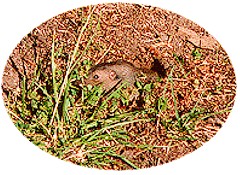|
||
| gopher | ||
| I was in the artichoke bed, digging up sickly plants, their roots gnawed to shreds by gophers, when I killed my first one. Beady-eyed, buck-toothed, yellow-toothed, his fur glistened as if greased. You'll spot gophers peering from the safety of their tunnels, poised to scurry back underground at the slightest twitch, but you rarely catch sight of them out in the open. | ||
| I let him have it with the shovel. I clobbered him once for pea vines nibbled at the base so the rest of the plant is left to wilt on its network of strings. Gophers wait till your hopes are high, pods pushing their way through the white flowers, to attack. I clobbered him once for tomato plants withering in wire baskets like corsages knocked loose from prom dresses in the back seats of cars parked along lovers' lanes. For beets and basil, for peppers and carrots, I clobbered him. And once for the heck of it, and once because I couldn't stop. | ||
| It surprised me, how sweet it felt to slaughter the gopher. I don't think of myself as bloodthirsty. Then there was a let-down, a kind of melancholy akin to the sadness that can steal over you after orgasm -- if you're a man, that is. I haven't heard women talk about the sadness much, the instant nostalgia that comes when the stars stop singing in your head and you have to enter the ordinary world of ordinary bodies again. | ||
| My shadow fell across the lifeless shell of the gopher. I wondered if Achilles felt a let-down after the flush of victory, standing over Hector's mangled body that day he caught him alone outside the walls of Troy. I looked around, noticing for the first time the vines I'd destroyed beating the gopher to death. Another victory like this and there would be no peas left to harvest. | ||
| We live in an age in which men still speak of victory in love, as well as in war, of conquest. The campaign was swift and decisive, say the generals. I'll have to tell that to my ruined peas. I picked the gopher up with the shovel and carried him out of the garden, dropping the body on the dirt road where vultures would be sure to find it. Maybe the victors always lose more than they win. Maybe the conquered always lose more than they appear to lose. I went into the house to fetch a copy of Plutarch, to read the biography of Pyrrhus, the greatest soldier of his time, his name enshrined in the term Pyrrhic victory. | ||
| I sat in the garden, reading. Pyrrhus was the only son of Phthia, daughter of the famous warrior Menon of Thessaly. The midwife pressed hard on her belly the afternoon he was born. A dream had troubled her sleep the night before, a dream of empty ships rotting in green fields like the carcasses of beasts, and Phthia had but little strength to muscle him out her loins into the light. The midwife pressed hard. To the west, clouds rained blood. Or maybe it was only the sunset on the underbellies of clouds. | ||
| Pyrrhus was born with his eyes open, and when the midwife placed the infant in his mother's arms, he turned his face from her breast to watch the death of a beetle trapped in a spider web. His eyes were pitiless as those of a hawk in an updraft scouting prey in the countryside. Phthia saw the flinty eyes, and the omens, and understood. Hard it was not to smother him with her pillow. | ||
| His father Aeacides, king of Epirus, entered the chamber. He held out a finger and the newborn gripped it with his small, pink fist, as though it were the haft of a sword, and wouldn't let go. Aeacides laughed, pleased that his martial son couldn't wait to teach those Latin upstarts with their barbarous tongue a lesson. Phthia felt the sunlight rush from the room. | ||
| In time, Pyrrhus was crowned king in Epirus. Ships full of men bound for plunder and glory set sail for Italy. It was there his name was added to victories more costly than defeats. Few were the vessels needed to bring home Greeks who soldiered with him on the fertile plains of Sicily, where cattle in their grazing still unearth human bones. | ||
| The light was fleeing the garden as I neared the end of Plutarch's life of Pyrrhus, thinking how Phthia might have tried to smother his name with pillows when she learned from the cries outside the palace of her son's death. In Argos a roof-tile pitched from a housetop by an unknown woman had left the great king lifeless in the glare of the street. | ||
| I closed the book and walked over to the road. The remains of the gopher were gone. The light was almost gone, the sun sinking into the sea. What moment in her life was Phthia remembering in her son's final hour, wishing that she could have it back? Was it perhaps the moment of his conception, an afternoon riding to a tryst in a new outfit trimmed with gold? Her earrings of silver hammered into the shapes of turtles jingle, the blue stones set on the turtles' backs come alive in the sheen of the sea. She rounds the hill where you get your first glimpse of the town, the harbor. The first star is out. Cosmos, cosmetic -- the words are cousins. A woman at a mirror applying kohl to accent her beauty becomes one with it. Light runs through the leaves of the olives like fingers stroking the strings of a guitar and there's this sudden music in her that wants to sing out. She dismounts. | ||
| Colored rags tied by the superstitious to the limbs of the oldest olive tree are blowing in the wind in the orchard where the gods come down at night to hear tales of themselves spun by those who die. An old woman weeding a cabbage patch on her knees sees Phthia in her finery and smiles. | ||
| The woman who became mother of the soldier whose name has come to mean victories more costly than defeats smiles back. A half-smile, lips ever so slightly lifted up at the corners of the mouth, this is the archaic smile frozen on the faces of young women sculpted in the dawn of our world, the one that always gives me the feeling women know something they're not saying. About ecstasy, about sorrow, and that's why they're not melancholy after lovemaking. | ||
|

